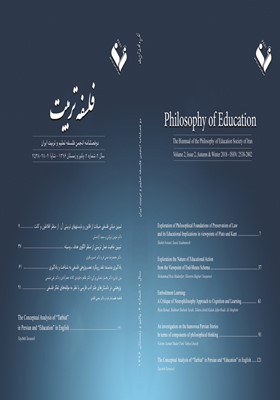تبیین دیدگاه معرفتشناختی آدلر در برنامه درسی پایدیا
محورهای موضوعی : تاریخ و ماهیت رشته فلسفهٔ تعلیموتربیت، مکاتب و رویکردهای فلسفهٔ تعلیموتربیت قدیم و جدید ،تاریخ اندیشه و عمل تربیتی (سیاستها، برنامهها، اقدامات و...) مفاهیم، گزارهها و نظریههای تربیتی آراء مربیان و فیلسوفان تربیتی روششناسی پژوهشهای تربیتی انواع تربیت مسائل تعلیموتربیت ایران و جهان برنامه درسی و آموزش در رشتههای گوناگون
1 -
کلید واژه: دیدگاه معرفتشناختی, مورتیمر جروم آدلر, برنامه درسی, پایدیا,
چکیده مقاله :
هدف اصلی مقاله حاضر، تبیین مبانی معرفتشناختی طرح پایدیا و نقد آن است. مبانی فلسفی، مبانی روانشناختی، مبانی جامعهشناختی و مبانی تاریخی بهعنوان بنیانهای اساسی تعلیم و تربیت به ویژه در حیطه برنامه درسی محسوب میشوند و مبنای معرفتشناختی میتواند در بستر مبانی فلسفی مورد تحلیل و بررسی قرار گیرد. در این مقاله، دیدگاه معرفتشناختی آدلر در قرن بیستم مورد بررسی قرار گرفت و ارتباط نظریه مذکور با برنامه درسی پیشنهادی او به نام پایدیا تبیین شد. روش تحقیق در مقاله حاضر، توصیفی- تحلیلی و نقد بر اساس دیدگاههای معاصر است. طبق یافتههای مقاله حاضر، بین سطوح خیر برای ذهن و صور معرفت که در دیدگاه معرفتشناختی آدلر مطرح میشود و سطوح یادگیری در برنامه درسی پیشنهادی او ارتباط منسجمی وجود دارد. با وجود این، نقدهایی بر اساس دیدگاههای معاصر میتوان بر دیدگاه معرفتشناختی او وارد کرد. نخست آنکه آدلر به معرفت ضمنی توجه نداشته است، دوم آنکه در بحث «جهانشمولی» و «ثبات» به نکته علم به معلوم اشاره نداشته است تا در چالش با بحث «پویایی علم» قرار نگیرد. سوم آنکه به بسط مهارتهای پیشنهادی در طرح پایدیا بر اساس صورت معرفتی «دانستنِ چگونه» نپرداخته است.
The main purpose of this paper is to explain the epistemological foundations of the Paideia project and its critique. Philosophical foundations, psychological foundations, sociological foundations, and historical foundations are considered as the basic foundations of education, especially in the field of curriculum, and the epistemological basis can be analyzed in the context of philosophical foundations... In this article, Adler's epistemological perspective on the twentieth century is examined, and the connection between this theory and his proposed curriculum, Paideia, is explained. The research method in the present article is descriptive-analytical and critique based on contemporary perspectives. According to the findings of the present article, there is a coherent relationship between the levels of good for the mind and the forms of knowledge that are presented in Adler's epistemological perspective and the levels of learning in his proposed curriculum. However, critiques based on contemporary views can be made on his epistemological perspective. Adler did not pay attention to tacit knowledge. Secondly, he did not refer to the point of science in the discussion of "universality" and "stability" and therefore situated in challenge of "the dynamics of science. Third, he did not develop the skills proposed in the Paideia curriculum based on the epistemological form of "knowing how".

